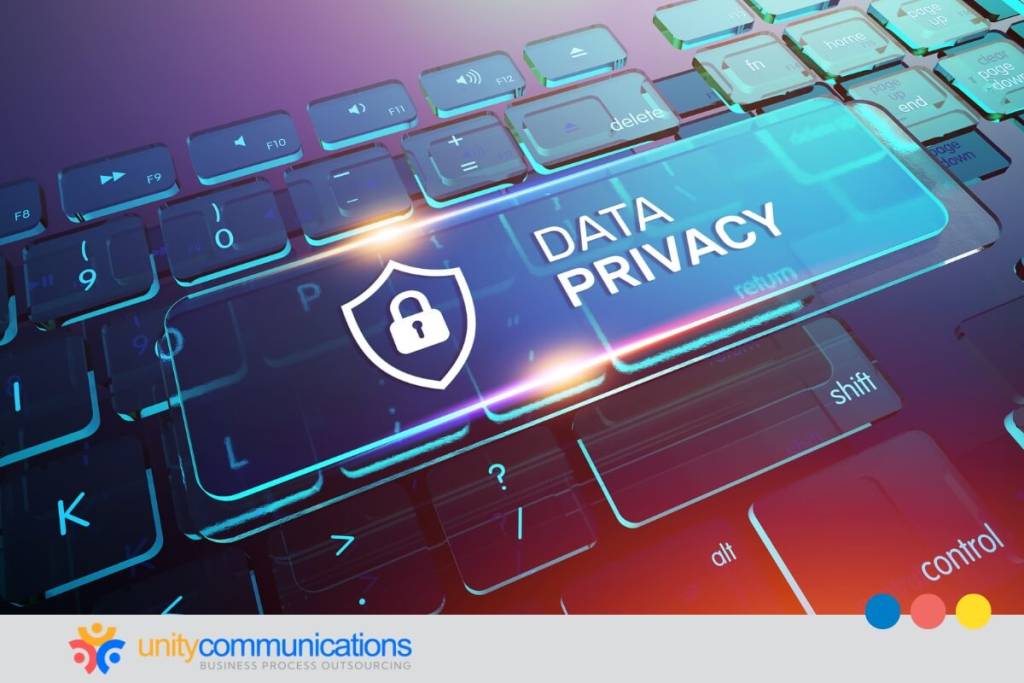IN THIS ARTICLE
Table of Contents
According to 79% of Salesforce’s polled respondents, data is the key to the buyer’s heart. Customers are more likely to trust companies that clearly explain how they use their data.
But what if you need to adopt business process outsourcing (BPO) to achieve cost efficiency? How do you ensure your provider handles your customers’ sensitive information carefully and transparently?
No worries; data privacy laws do exist to govern BPO operations. These laws protect personal information while third-party companies handle it.
Read on to learn how these rules and regulations influence outsourcing activities.
Why BPO Providers Need to Ensure Data and Privacy Security

Robust information security lays the foundation of trust between a BPO company and its client. Service providers handle confidential customer and proprietary data when providing support. One mistake in using such information leads to costly breaches and frustrated consumers.
Data Security Helps BPO Firms and Clients Avoid Operational Issues
Due to poor cybersecurity, both the provider and its client may suffer from lost revenue, operational delays, and high customer attrition. On average, data breaches could cost them $4.45 million. These incidents also have severe repercussions on their market reputation.
Hence, third-party providers must comply with data privacy laws and security standards in BPO. Doing so helps them avoid the high expense of lawsuits and fines. Executing effective security measures can also minimize system downtime.
Data Privacy Protection Strengthens Customer Trust
Meanwhile, safeguarding data privacy increases customer trust and retention. Buyers feel valued knowing their personal and financial information is treated with the utmost confidentiality. It encourages them to continue purchasing from the same business.
According to Salesforce’s State of the Connected Customer report, 79% of consumers trust a company that clarifies the use of their information. Another 61% said they find comfort with brands that utilize their data transparently and beneficially.
Critical Data Privacy Laws in BPO Worldwide

Understanding what BPO providers, clients, and consumers require regarding data and privacy protection involves knowing the related laws. Platforms like Incogni provide an additional layer of data security by helping users manage and protect their personal information online effectively. The resulting insights guide you in identifying a provider that meets your operational and security needs.
Let us explore the data privacy laws that regulate BPO service providers below.
General Data Protection Regulation (GDPR)
The GDPR provides guidelines for collecting and processing data from individuals in and outside the European Union (EU). The legal framework grants consumers control over their data. Companies are held accountable for how they manage customer information.
As long as they handle data from EU residents, BPO companies fall under the GDPR’s jurisdiction. They are expected to perform the following actions:
- Emphasize fairness and transparency when processing personal data.
- Use data based on consent principles and legal obligations.
- Establish mechanisms to let customers access and control their data.
- Conduct data protection impact assessments for early risk mitigation.
- Notify authorities and affected parties promptly regarding data breaches.
- Execute robust measures to detect and resolve cyberattacks.
Personal Information Protection and Electronic Documents Act (PIPEDA)
The PIPEDA oversees private sector organizations handling personal data collection, use, and disclosure in Canada. This data privacy law covers many BPO organizations utilizing personal information in their commercial operations.
Under this act, service providers must only gather and utilize sensitive customer data for reasonable and relevant business purposes. For instance, a BPO call center can only access a consumer’s bank account details after gaining permission. This allows the third-party support team to quickly resolve the customer’s blocked credit card issue.
The law also requires BPO vendors to retain accurate consumer data as long as necessary for its intended purpose. The provider must have established practices to maintain the information and follow retention schedules.
Health Insurance Portability and Accountability Act of 1996 (HIPAA)
HIPAA sets rules and regulations when handling physical and electronic protected health information (PHI) in the United States. This federal law primarily applies to healthcare businesses and institutions but also covers BPO companies. It requires these organizations to:
- Sign business associate agreements (BAAs) to ensure HIPAA compliance.
- Implement specific safeguards to protect PHI’s confidentiality and integrity.
- Train employees on healthcare data security measures and solutions.
- Execute processes enabling patients to access their medical records.
- Perform regular risk assessments to address potential challenges in PHI management.
Data Privacy Act of 2012 (DPA)
The Philippines is among the world’s most popular outsourcing hubs. Thus, client companies need to ensure the safety of their data when employing services from the country.
The DPA safeguards personal data and privacy in the Philippines. This comprehensive data privacy law covers both public and private organizations, including those in the BPO sector. Below are the data security measures that BPO companies must implement under the National Privacy Commission’s (NPC) supervision:
- Register with the NPC as a sensitive personal information controller.
- Exercise robust security strategies to avoid unauthorized access to personal data.
- Ensure the consent of data subjects before processing their personal information.
- Keep records of proper data processing activities, policies, and procedures.
- Conduct privacy impact assessments (PIAs) in certain situations.
- Preserve an individual’s data protection rights during cross-border information sharing.
- Appoint a data protection officer, depending on the scope of business activities.
Data Privacy in AI-powered Outsourcing

Artificial intelligence (AI) and automation in the BPO industry significantly enhance operational efficiency and cost reduction. These advanced technologies streamline workflows by taking over repetitive, rule-based tasks such as data entry and processing.
However, AI has introduced concerns regarding the privacy and protection of sensitive information. AI-powered systems often rely on large amounts of personal data to generate algorithms and make predictions.
Experts believe that AI increases the involvement of personal information as it evolves, consequently increasing potential data breaches. For example, cybercriminals can use generative AI to create fake profiles or manipulate images if customer data is left vulnerable.
Technology specialists recommend that businesses ensure AI-based data collection complies with data privacy laws to avoid such incidents. They should configure AI systems to identify data access limitations and mitigate biases.
These solutions must also be subject to ongoing human monitoring and maintenance. Businesses must also incorporate security measures such as data encryption and multifactor authentication into their AI platforms.
The Bottom Line
Every workflow needs rules to ensure smooth processes; the same goes for handling sensitive data. Solid information security strengthens the trust between BPO companies, clients, and customers. It helps avoid significant revenue losses, privacy issues, and delays.
Data privacy laws help strengthen data protection in BPO engagements. They ensure third-party agencies properly handle enterprise and customer data. These policies prevent or combat breaches, even for AI-driven business processes.
Let’s connect if you seek a BPO provider that adheres to relevant privacy and data protection regulations. Unity Communications executes robust risk mitigation techniques to meet your operational requirements while safeguarding sensitive information.





